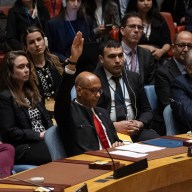“I care about social and human rights,” Lady Gaga told Metro when plotting this issue, “because it affects my fans.” She couldn’t have picked better timing: Today is International Day Against Homophobia and Transphobia, a day dedicated to raise awareness for gay rights worldwide.
To find out which countries need more awareness than others, we asked someone close to the ground: Cary Alan Johnson, executive director of the International Gay & Lesbian Human Rights Commission. His organization advances human rights via advocacy on the local level, reporting from every continent.
The good news first: “Huge progress” is how Johnson describes what he’s seen over the last 20 years. “Every country in Europe has protection for its citizens and many countries have protection of family rights, for example the right to marry,” he says. “And every country in Latin America has decriminalized homosexuality. And we even have progress in some African countries. We still have two-thirds criminalizing it but some, like Mozambique, have made it clear that they’re committed, while South Africa has the most progressive constitution in the world, even going so far as to uphold the right to marry and to adopt children.”
And now the bad news: Even in those countries, violence still strikes. In “progressive” South Africa, just last month, Noxolo Nogwaza, a 24-year-old well-known lesbian activist, died after being stabbed with glass shards, during what’s known locally as a “corrective rape.”
The incident suggests discrimination is hard to eradicate completely. “Those in the Middle East and certain parts of Africa are still mired in a certain type of social conservatism that leads to violence,” says Johnson, adding that poverty and religion complicate matters. Kids who are “different” are often denied an education. “Lesbian girls in Uganda get thrown out of schools,” he says. “Transgender kids in Belize and other places in the Caribbean cannot attend. Families in Pakistan and Bangladesh refuse to pay school fees for those who are non-normative or queer. If you can’t get an education, you can’t support yourself and you’ll always face discrimination.”
So what can one do? Activate. Unite. And be patient. “Time” is Johnson’s prescribed cure. “It’s generational,” Gaga tells us. The world will accept gays when they see they’re normal people, like our postmen and doctors and … international superstars.
Four recent gay-rights milestones
1 DON’T ASK, DON’T TELL: Last year in the United States, after years of debate and despite anger from military leaders, a bill passed allowing U.S. soldiers to serve without hiding the fact that they’re gay or bisexual. The law won’t go into effect without more study about possible anti-gay violence among troops.
2 MARRIAGE IN MEXICO: Two years ago, Mexico City legalized same-sex marriages and adoptions by same-sex couples, and the law went into effect last year, prompting other territories to do the same. Argentina did the same in 2010, while other nations in South America are considering it.
3 IT’S LEGAL IN INDIA: In 2009, the Delhi High Court decriminalized homosexuality throughout India. While the change is still being challenged legally, “it took millions out of the shadows in the largest democracy” says Johnson of the IGLHRC, who hopes other nations follow their lead.
4 RWANDA EMBRACES GAYS: “Through war, they experienced how dangerous it is to make one group of people the ‘other,’” says Johnson. “The Rwandan government has signed on to U.N. statements about the protection of LGBT rights. They have learned their lessons.”
CASE?STUDY: Eli Kaplan-Wildmann
‘I’m gay and I was in Israel’s armed forces’
People say the Israeli Navy is gay so I went into the Navy.
The Israeli Defense Forces is a microcosm of the country, since everyone must do service. So you can be openly gay but work alongside people who are still weirded out by the LGBT community. I slowly found my place and was careful about who I came out to. There were never any direct conflicts.
As a drill sergeant, I could be who I wanted to be, a caring teacher. I invented a ceremony that involved plunging [your] hands into motor grease and screaming. I guess you could say I spread a bit of rainbow onto the army around me.
CASE?STUDY: STU RASMUSSEN
First US transgender mayor
You’ve just been re-elected the mayor of Silverton, Oregon. Has being transgender hindered your progress?
At first blush, that would be true but the community has known me as reasonable, bright, practical and devoted for a long time. The only place where my election was not news was here in Silverton.
You recently got in trouble for wearing a short skirt to a school event.
The skirt was fashionable but short. But I listened. The community told me, “Look, Stu, we don’t mind that you dress as a woman but we’d like you to dress as a lady.” I can wear what I want on the street. Well, that’s probably the wrong thing to say. I’m not a streetwalker! [Laughs] So I have toned it down. I am comporting myself now as the mayor. But I have to confess that I like the look. I like my legs. They are long and people comment on them. Perhaps if I could get a face transplant and be Lady Gaga, it’d be better. She is breathtaking.
Her new album has the theme of being “Born this Way.” How important is this idea?
It’s taken me years to come to terms with it but now that society has moved beyond castigating people for their physical or mental makeup, it’s a positive step indeed. But it is a good joke when newcomers pass through. They’ll eye me from the rear. It’s amusing in the bars for them to hear, “That’s our mayor.”
















